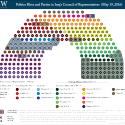 |
 |
Kurdish Objectives in Iraq’s Political Crisis
May 21, 2016 - Patrick Martin


Key Takeaway: Iraqi politics are deadlocked. Several political parties and blocs boycotted the Council of Representatives (CoR) following the Sadrist protesters’ first breach of the Green Zone on April 30. The Kurdish Alliance, a bloc that consisted of nearly one-fifth of the CoR, withdrew on May 5. The bloc has now split, and two of its component political parties, the Patriotic Union of Kurdistan (PUK) and Gorran, formally reunited on May 14 to create a new bloc. The PUK and Gorran were incentivized by the urgent need for financial assistance to the Kurdistan Regional Government (KRG) and likely by Iranian urging. A loan from the IMF in which Baghdad and the KRG will have a share proved decisive in incentivizing their cohesion. The PUK-Gorran Alliance will therefore likely strengthen ties between Baghdad and Arbil. Their rival, the Kurdistan Democratic Party (KDP), retains ambitions of regional independence and a stranglehold on political power in the KRG. The Kurdistan Democratic Party (KDP) will either have to reintegrate or seek new political partners. The PUK and Gorran will likely eventually return to the CoR. Although they are still negotiating with the KDP, Kurdish parties are unlikely to return the CoR as one entity, ending what had been a significant, cohesive bloc. The new political alliance will nevertheless shift the power dynamics of both Baghdad and Arbil. Read the rest of this update online here.
__________
Note: ISW has tracked Iraq’s building political crisis since early February, following political reforms proposed by Prime Minister Abadi and the challenges to them. The Council of Representatives (CoR) has also faced challenges from an increasingly fractious set of parties some of which have attempted to break off from the CoR and form a “rump” Parliament that later morphed into a new opposition bloc, the Reform Front, composed of members from various parties. As with all political maneuvering, ISW has relied on media reporting as well as our own assessment of likely political coordination, cooperation, and alignment among and between individuals and parties. We are currently re-examining our methodology in light of recent maneuvers and statements leading up to the CoR Ramadan break and will update our CoR graphic when that analysis is completed.